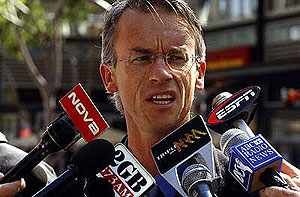
National Rugby League CEO David Gallop at a press conference at NRL headquarters. AAP Image/Mick Tsikas
After yet another player controversy, this time involving the Penrith club, it’s time for the leader of the NRL to be held accountable. No sport has had to endure the negative off-field headlines that the NRL has under the reign of David Gallop since 2002.
Despite this string of incidents, never at any stage has Gallop been made accountable or held to his responsibility for the image of the code. However, he has regularly been credited with the game’s successes, including record crowd figures five years ago.
As Chief Executive of the NRL, Gallop is the figure responsible for the actions of the sixteen NRL clubs and the players in those clubs, and for the performance of match officials, crowd figures, sponsorship, popularity, and the like.
But his responses to player misbehaviour have been inconsistent, reactive, and at times hysterical.
He has given no impression of leadership on the issue, and clubs haven’t felt empowered to tackle problems themselves.
When the NRL de-registered Greg Bird and Todd Carney from playing the 2009 season, it was one of the NRL’s harsher penalties, but the ineffectiveness of the response is now seen with each weekend bringing a new drama.
One of the reasons drinking and anti-social behaviour amongst rugby league players generates so many headlines is because a reactive Gallop has regularly allowed molehills to be turned into mountains.
Leading player representatives have previous highlighted this apparent willingness to make a public show on player behaviour issues, rather than being tough but fair.
In the case of Dane Tilse, who was banned from the game in 2005 after a university dormitory rampage, Rugby League Professionals’ Association president Butterfield questioned whether Tilse had received “procedural fairness” because of the “enormous pressure [on the Knights] from the NRL.”
Similarly, when Sonny Bill Williams was arrested for relieving himself behind a tree in 2007, Gallop gave the sort of running commentary expected from a talkback host, rather than the constructive comments of a leader.
“He is inches from enough is enough … he needs to be placed on a formal program to deal with his problems,” he said.
If Gallop left the problem to the clubs, then the hysteria and fanfare wouldn’t be so significant or dramatic, and the clubs could deal with the problems effectively.
People will blame the newspapers but when they turn to Gallop for a comment, he delivers with interest.
The punishment of Manly’s Brett Stewart was another example of Gallop’s hysteria.
Stewart, at the most, should have been stood down for one game, only to clear the air. Four weeks – which Gallop admitted was punishment for Stewart’s drunkenness – was far too much.
Stewart has pleaded not guilty in court.
The Australian way has always been innocent before guilty. But in the NRL, it seems it’s guilty before being innocent.
Gallop’s inconsistency is not just in matters of player behaviour.
The handling of the Bulldogs two points issue – in which they were stripped for having fourteen players on the field – took over four weeks to ‘resolve’. But a precedent was set by Gallop in 2004, 2007 and 2008 that fines, not loss of points, are the punishment for an extra player on the field.
Phil Gould in the Sun Herald more than a week ago stated that the Bulldogs should be fined and that in no way was the incident a form of cheating.
Rugby league is the best sport in the world, but it’s also the worst administered.
The game needs a vibrant, strong and positive leader with vision, but also someone with an understanding of the game’s traditions in New South Wales and Queensland who can take the game into a new era and stand up to the vested media interests clouding the game.
But Gallop hasn’t been able to stand up to these interests, seen in poorly handled contract negotiations at all levels, the under-selling of the game’s TV and new media rights, and not allowing the game to have full reach through radio and free to air television in Australia.
For off-field incidents that bring the game into disrepute, an independent judiciary should be set up to decide suspensions, much like the way the judiciary decides penalties for high tackles.
The onus to make decisions should be taken away from the clubs, unless they break the internal code of conduct, like the case of former Bulldog lock Reni Maitua. The leader of the game certainly shouldn’t be making comments. He should be leaving things to the clubs and the independent judiciary panel.
Players today live in fantasyland from a young age. Player welfare is extremely important. But of greater importance is the leadership within our game.
The Penrith incident is the latest example of how the leadership is failing young players, and should be the final straw.
Changes must now take place.
Matthew O’Neill is an expert columnist with www.rleague.com.





























































































